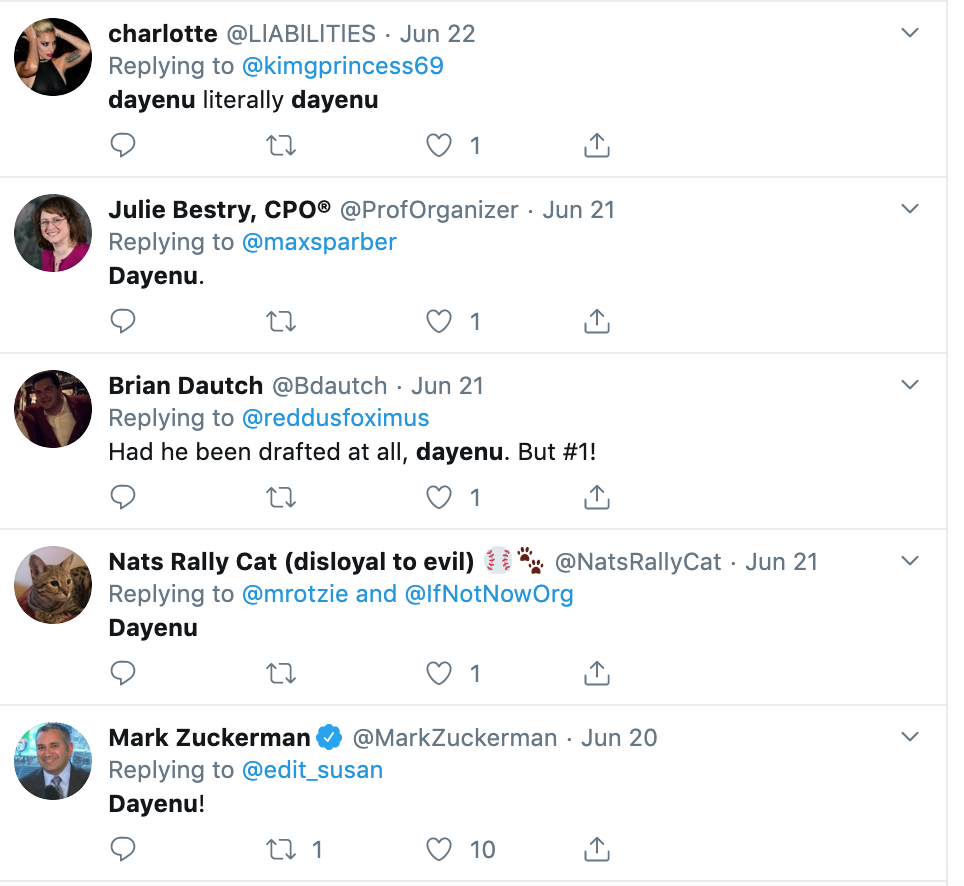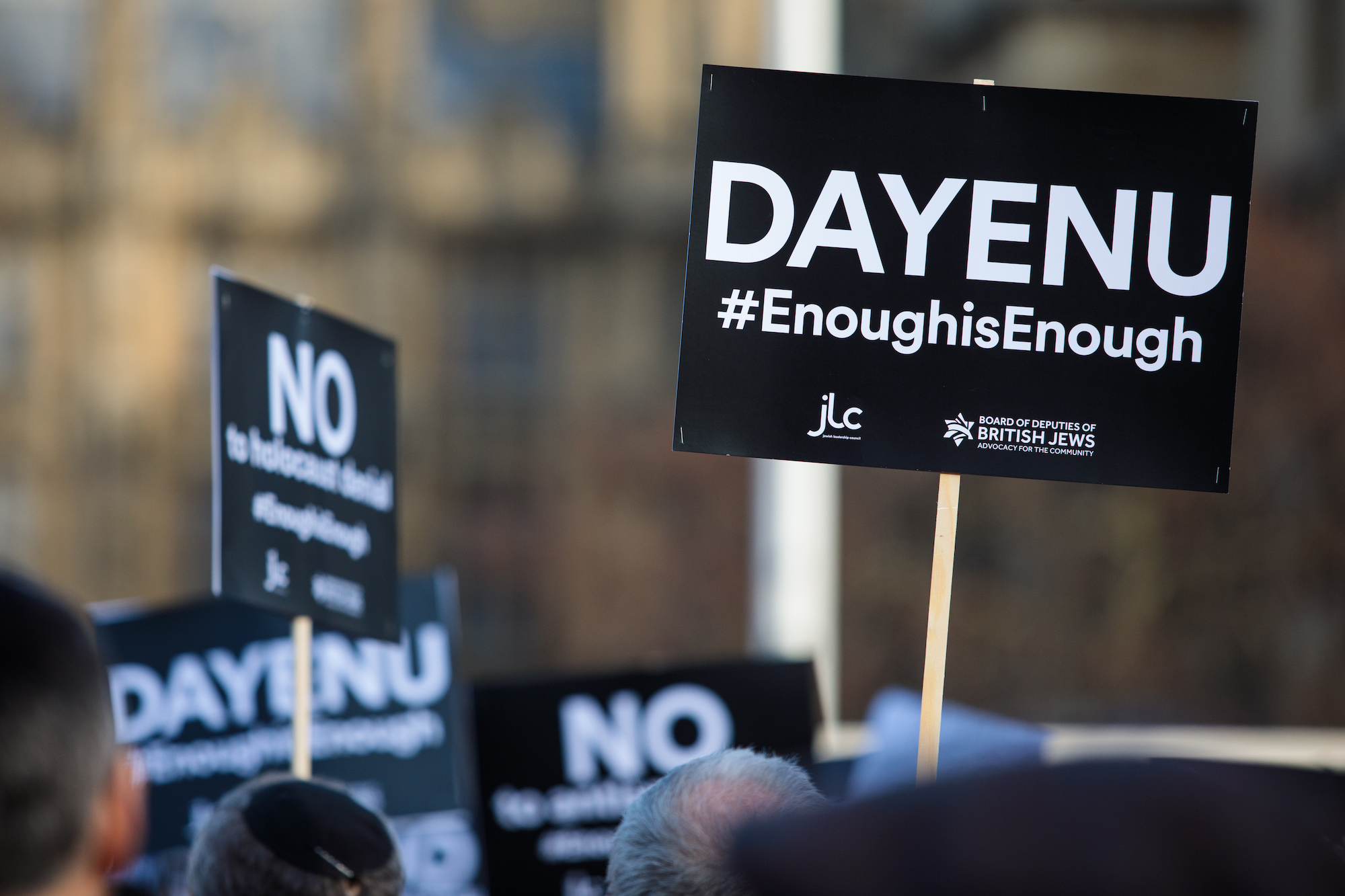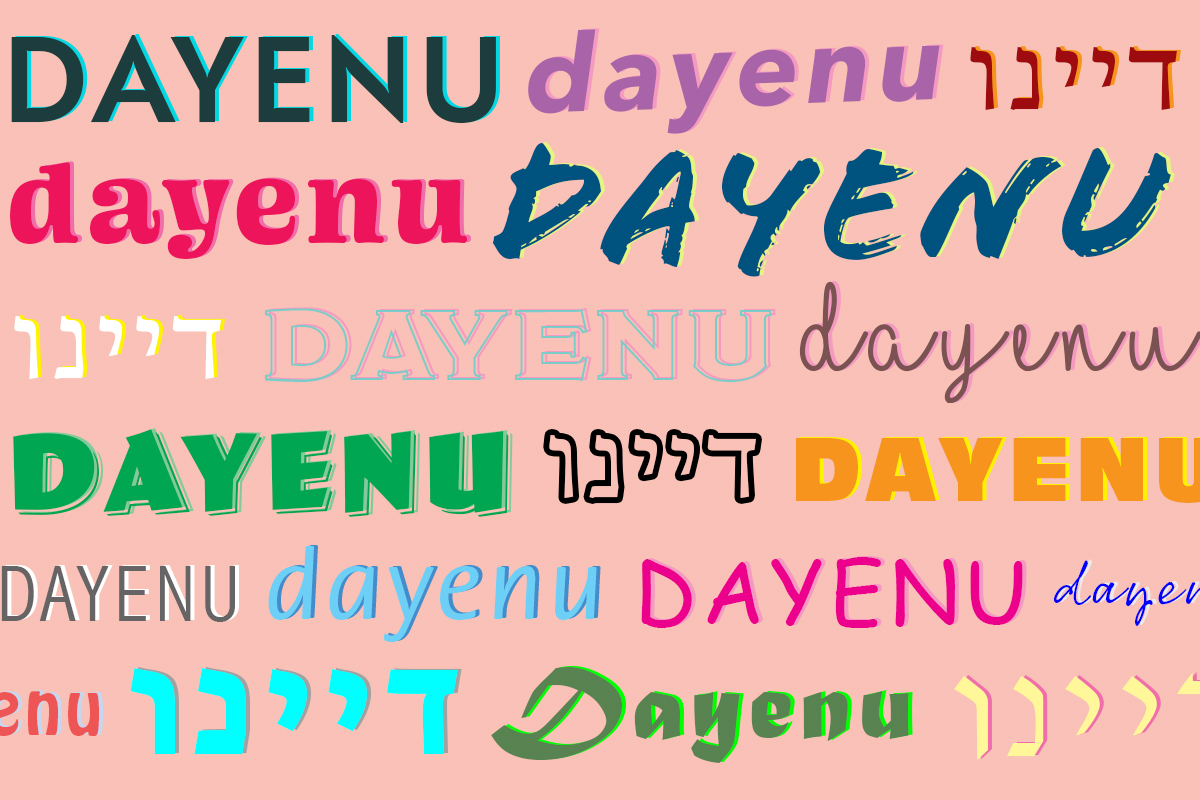Growing up, my favorite part of the Passover seder was when my family would start singing Dayenu. My grandpa’s voice would boom from the head of the table, we would all get really enthusiastic about singing the chorus, and only my mom would really know the intermittent verses. Eventually, we would just sing the chorus on a loop.
At my boyfriend’s family’s seder many years later, they read Dayenu in English instead of singing it in Hebrew, and I was deeply disappointed. (When I texted to ask if I can include this anecdote in this article, my boyfriend said I wasn’t deeply disappointed, I was outraged.) The following year, thankfully, they sang it.
All this is to say: Dayenu, which translates to “it would have been enough,” is a highlight of Passover and a staple of the modern seder.
But more recently, I’ve begun to notice references to Dayenu with increased frequency online, year-round. Suddenly, Dayenu isn’t just my grandpa singing at Passover — it’s on Twitter and being used to (successful) comedic effect.
Here’s a tweet from Sarah Kay, a poet, from this past April that I still think about on a regular basis:
https://twitter.com/kaysarahsera/status/1120804217428615169
It takes a pop culture moment — Beyoncé releasing her Coachella performance as a documentary, Homecoming, on Netflix, and releasing a live album at the same time — and turns it into the traditional format of the iconic Dayenu song.
But the Dayenu tweet that made me legitimately gasp and confirmed my suspicion that Dayenu was a rising trend I needed to write about? Barbra Streisand tweeting “Dayenu” about receiving flowers from Ariana Grande after the two performed a duet together. Yes, you read that sentence correctly. Barbra Streisand tweeted “Dayenu” about getting flowers after performing with Ariana Grande.
.@arianagrande I can’t get over this beautiful arrangement and love your sweet note. Yes, let’s make a date for manicures! I have one at my house every Thursday. Dayenu! 💅♥️💛💚💙 pic.twitter.com/lkVqMwOha8
— Barbra Streisand (@BarbraStreisand) August 14, 2019
There’s so much to take in about this tweet, from Ariana’s note to Barbra Streisand to the fact that Babs is seemingly responding to Ariana asking her to get manicures together?! But let’s focus in on the Dayenu: What I think Barbra Streisand is saying is that, if she got manicures at her home every Thursday, Dayenu. If Ariana joined her for this manicure date, Dayenu.
Dayenu has permeated our online lingo so much that 77-year-old iconic Jewish singers and actresses can use it casually in a tweet and no one blinks an eye. (To be fair, I blinked an eye.)
What works about Dayenu as a meme/tweet structure is the escalating premise. One thing happens, then another even better thing happens, and it just keeps building and getting better. And, I guess, taking out the comedy, this is also what works about Dayenu as a religious song. The lyrics to Dayenu list the increasingly amazing things that God does for the Jewish people, and each line builds on the last:
If He had taken us out of Egypt and not made judgements on them; Dayenu.
If He had made judgments on them and had not made [them] on their gods; Dayenu.
If He had made [them] on their gods and had not killed their firstborn; Dayenu.
If He had killed their firstborn and had not given us their money; Dayenu… (it’s a long song!)
But back to pop culture. When Taffy Brodesser-Akner’s debut novel, Fleishman Is In Trouble, came out this past summer, she was everywhere. For good reason: Fleishman, and Taffy, deserve all the hype. But the best tweet about it all? From publicity director Rachel Fershleiser:
https://twitter.com/RachelFersh/status/1140977105544601601?s=20
The escalating praise — best profiles, great journalism, supportive of other women, a genuinely wonderful novel — fits perfectly into the Dayenu structure.
Another example of this structure of escalating excitement comes from the co-founder and editor-in-chief of Autostraddle, Riese Bernard:
Kristen Stewart in a lesbian rom com
Dayenu
Kristen Stewart in a clea Duvall directed lesbian rom com
Dayenu
Kristen Stewart in a holiday themed clea Duvall directed rom com
Dayenu
Kristen Stewart and Mackenzie Davis in a holiday themed clea Duvall rom com
IM GOING TO DIE https://t.co/2HWIcAkWbb— riese (@autowin) January 25, 2019
Another from Bernard, about Broad City (yes!):
AHEM updated to include info on Abbi dating a woman in @broadcity's final season! When Ilana was openly bisexul, dayenu, but Abbi AND Ilana both being Jewish bisexual protagonsits?! I CAN'T WAIT https://t.co/C4ykUZnGQ4
— riese (@autowin) January 7, 2019
And then there’s Chicago Review of Books editor-at-large Bradley Babendir, who used Dayenu to tweet about the Cats trailer (this one actually sticks very closely to the structure of the original Dayenu, referencing the previous line):
https://twitter.com/therealbradbabs/status/1151972836665372672?s=20
There are countless examples — since Dayenu is, at its core, an expression of gratitude, it works when someone is tweeting praise/love about anything. Even a political scientist got in on the Dayenu fun:
I had a great #APSA2019. Not on fire, dayenu. Saw good panels, dayenu. Got encouraging feedback, dayenu. Saw friends and made new ones, dayenu.
I guess next year won’t be in Jerusalem, but it will be year after Labor Day.
— Jason Reifler (@JasonReifler) September 1, 2019
Dayenu even works when it’s not in the structure of the original song. When TV critic Emily Nussbaum was discussing Game of Thrones, she wrote, “if Dany & Jon had died, DAYENU,” stating it would have been enough — and a much more interesting plot.
Now that I've had some sleep, my main opinion on GoT is that if Dany & Jon had died, DAYENU. That would have set up a much more interesting game board for the final three—and been a callback to the S1 head-chopping.
— Emily Nussbaum (@emilynussbaum) April 29, 2019
This one just made me laugh (oh, Fyre Festival…), by comedian Eitan Levine:
How blessed are we to live in a world with not one, but TWO Fyre Fest docs?
Even one Fyre Fest documentary– Dayenu
— The Levine Machine (@Eitanthegoalie) January 17, 2019
And this one deeply resonates with me, as I am in love with Taika Waititi:
DAYENU. https://t.co/94IL0YAtKs
— Jenni Miller (@msjennimiller) July 26, 2019
There’s also thousands of tweets of people simply responding “Dayenu” to random things. Here’s several from the same few days in June, responding to different tweets:

And then we get to sports, where the use of Dayenu is quite prevalent. Do sportswriters feel as if big moments in sports are miraculous, just as the Jews felt during the Exodus from Egypt? Who knows! But there are many, many examples. Like this 2017 headline on MLB.com: “For Israel to get this far, Dayenu,” in which writer Jonathan Mayo expresses gratitude for Team Israel’s run in the World Baseball Classic. Or this 2019 essay in The Ringer about basketball player Damian Lillard, where Ian Karmel writes of Lillard’s game-clinching shots, “Twice in a lifetime would be enough, dayenu. Twice in a five-year span? Forget it.” In a 2019 season preview about Tottenham Hotspur, a British soccer (er, football) team, Joel Wetheimer writes, “If Tottenham’s transfer window had ended with just the acquisition of Ndombele and nothing else happened, dayenu.” There’s more: Dayenu was referenced in a story about the Yankees and the 2018 MLB Playoffs, about baseball player Willians Astudillo, about the 2018-19 Los Angeles Lakers, and the pitcher Francisco Lindor.
And it’s not just sports writing that uses Dayenu — pop culture writers don’t shy away from the term, either. In an essay on Adam Driver (who is not Jewish, before you Google), Mark Asch writes in Nylon, “If the way Driver used his body in his performances existed solely to seed viral thirst posts, then, y’know, dayenu.” In an essay on The Young Pope in The Ringer, Alison Hermann writes, “If all we got out of this was a CGI kangaroo and nuns playing basketball, dayenu.” And, most recently, in a review of Hustlers from Refinery29, Anne Cohen writes, “Had it just been about J.Lo. wrapping Constance Wu safely in her giant fur and waving cash in the air, that would have been enough. Dayenu!” (To that, honestly, amen.)
Outside of online media, Dayenu has also made its mark. In Lin-Manuel Miranda’s musical Hamilton, Eliza Hamilton (Alexander Hamilton’s wife) sings, in a song literally called “That Would Be Enough”: “Look at where you are/ Look at where you started / The fact that you’re alive is a miracle / Just stay alive, that would be enough.” Yes, this is a Dayenu reference. At least the Genius annotators seem to think so. (Others agree.)
But it’s not all jokes, sports, Hamilton, and gratitude — Dayenu has also emerged as a political slogan. In this iteration, it’s not a thankful “it would have been enough,” it’s a “stop, enough, we’re done, we’re tired.” Some argue this warps the meaning of Dayenu — people are frustrated that it is being translated to simply mean “enough” — but, I believe the ubiquitous of Dayenu in our political landscape shows just how prominent this Jewish song has become. (And I would be remiss not to note the deeply unfunny use of Dayenu at the Republican Jewish Coalition this year, where they replaced God with Trump. Seriously.)
Last year, in Britain, “Dayenu” became a rallying cry against anti-Semitism in the Labour party. In March 2018, signs that said “#EnoughIsEnough” and “DAYENU” signs filled Parliament square in protest of what was happening.

(Image by Jack Taylor/Getty Images)
It also became a protest banner during the March for Our Lives in D.C., as JTA reported: “It took 21 hours for 75 teens to bus in from Minneapolis-St. Paul. They turned up outfitted in T-shirts that were colored orange for gun control and read #Dayenu — ‘it would have been enough’ in Hebrew.”
In a very different type of Dayenu tweet from those above, one person used Dayenu to name where mass shootings have occurred:
VA Tech
Dayenu
Columbine
Dayenu
Aurora
Dayenu
Tucson
Dayenu
Charleston
Dayenu
Sutherland
Dayenu
Pittsburgh
Dayenu
Sandy Hook
Dayenu
Las Vegas
Dayenu
Parkland
Dayenu
Orlando
Dayenu
Austin
Dayenu
San Bernardino
Dayenu
Ft. Hood
Dayenu
El Paso
Dayenu…………………………….— Marilyn Press🦋🌈🏀⛷💙☮️🇺🇦 (@marilyn_press) August 4, 2019
When you think about the original meaning of Dayenu — gratitude — this feels weird. But when you think about how Dayenu has transmuted into simply “enough,” and used as a tool for protest, it becomes powerful.
Dayenu has also become a form of critique against the current Trump administration, like this tweet by comedian Orli Matlow:
Had they used Jewish memory as a tool to deflect from their concentration camps and not used our name to incite violence against a Muslim congresswoman
Dayenu
— Orli Matlow (@HireMeImFunny) July 18, 2019
Or this one, from writer Emily Hauser:
I mean they're concentration camps but if they go down in history as Trump camps dayenu
— Emily L. Hauser @emilylhauser.bsky.social 🟣 (@emilylhauser) June 24, 2019
Dayenu has become an indicator of anger, of frustration, of feeling fed up with how things are going.
But the question remains: If someone seeing these references to Dayenu isn’t Jewish, do they have any idea what it means? There is a definite mainstreaming of specific Jewish (mostly Yiddish) words — “chutzpah” and “schlep” are seemingly everywhere now — so what does this mean for Dayenu? Is what’s so funny about seeing Dayenu the fact that it’s very much an in-joke for Jews? I mean, it’s from the freakin’ haggadah! You really have to be Jewish to understand the power of the joke, and to fully get the reference.
When I shared an example of one of these tweets in a Jewish Facebook group I’m in, someone commented on how specific this genre is. As more and more people start to tweet Dayenu, and more and more writers use it to denote baseball miracles, does it lose its magic? Or will it remain a reference, a little nod and wink, to the seder table, to gratitude, to feeling fed up, that only Jews will truly understand? And is that the point?
The chief TV critic of Rolling Stone, Alan Sepinwall, uses Dayenu constantly on Twitter, and has been doing so for quite some time. As he explained over e-mail to Alma, “(He even wrote a Dayenu recap of Lost on his blog in 2008.)
I’m not sure how an essay on Barbra Streisand tweeting “Dayenu” at Ariana Grande became a 1600-word essay about how American Jews are expressing their dissatisfaction and anger with the current political climate, but if you’ve stuck with me through the whole piece, I’m very grateful. Dayenu.



